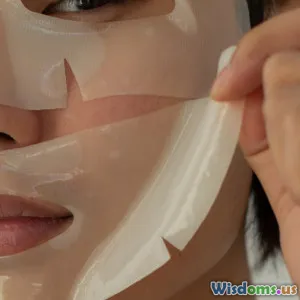
What Causes Eczema Flare Ups and How to Avoid Them
9 min read Explore the causes behind eczema flare ups and discover practical strategies to prevent them for healthier, calmer skin. (0 Reviews)
Understanding What Causes Eczema Flare Ups and How to Avoid Them
Eczema, medically known as atopic dermatitis, is a chronic skin condition characterized by dry, red, itchy, and inflamed skin. For those who experience eczema, flare ups can be not only physically uncomfortable but emotionally draining—impacting quality of life and daily activities. Have you ever wondered why sometimes your eczema is calm and other times it flares excessively? Understanding what triggers these flare ups is the crucial first step in managing this condition and regaining control over your skin health.
In this in-depth exploration, we’ll clarify the most common causes of eczema flare ups and arm you with effective ways to prevent them. From allergens and irritants to lifestyle factors and weather changes, this article offers practical insights and actionable tips to keep eczema in check.
What Exactly Is an Eczema Flare Up?
Before diving into causes, it’s important to grasp what happens during a flare up. An eczema flare up is an episode when symptoms suddenly worsen, leading to increased itching, redness, and inflammation. The skin’s usual barrier becomes more vulnerable, increasing susceptibility to infection and damage.
Dr. Linda Villarreal, dermatologist at the Skin Health Institute, explains, “Flare ups indicate an immune system overreaction and skin barrier breakdown. The challenge is both identifying and minimizing environmental or internal triggers that provoke this heightened response.”
Common Causes of Eczema Flare Ups
1. Allergens: Pet Dander, Pollen, and Dust Mites
Many eczema sufferers have underlying allergies. Exposure to common allergens like pollen or pet dander can prompt immune responses that aggravate eczema symptoms. A 2016 study in the Journal of Allergy and Clinical Immunology found that dust mite exposure correlated with increased eczema severity in children.
Real-World Tip: If you have pets, regular grooming and cleaning can reduce dander. Using allergen-proof covers on pillows and mattresses and maintaining humidity around 40–50% can help decrease dust mite populations.
2. Skin Irritants: Harsh Soaps, Fragrances, and Chemicals
Irritants are substances that can damage the skin barrier directly. Chemicals in detergents, soaps, and fragrances are notorious for triggering flare ups. For example, sodium lauryl sulfate, a common detergent ingredient, is known for irritating sensitive skin.
Dermatology studies emphasize avoiding perfumed products and opting for gentle, hypoallergenic options. Even certain fabrics like wool can physically irritate the skin, leading to itching and scratching cycles.
3. Climate and Weather Changes
Extreme weather conditions, such as cold, dry winters or hot, humid summers, can exacerbate eczema. Dry cold air depletes moisture from the skin, whereas sweating and heat in summer may lead to irritation.
A survey from the Eczema Society highlights flare ups increasing during winter months, especially in regions with low humidity. Skin functions best when moisturized consistently, regardless of external temperatures.
4. Stress and Emotional Factors
The skin-brain connection is less visible but very real. Psychological stress can trigger and intensify eczema by disrupting immune responses and skin repair.
Clinical research indicates that during stress episodes, cortisol levels negatively affect skin barrier function, increasing inflammation. Incorporating stress-management techniques like mindfulness or yoga can play a crucial role in eczema management.
5. Infections and Microbial Imbalance
Bacterial infections, particularly by Staphylococcus aureus, can worsen eczema, creating a vicious cycle of itching and injury. Eczema-affected skin often harbors more bacteria due to compromised barriers.
Maintaining proper hygiene, using medicated creams as advised, and promptly addressing infections are essential steps.
6. Dietary Triggers
While diet’s role is individualized, some people notice that certain foods—like dairy, eggs, nuts, or gluten—worsen their eczema flare ups. Food allergies can stimulate immune responses that inflame the skin.
Consulting allergists for testing and trying elimination diets can provide clarity and help tailor nutritional approaches.
How to Avoid Eczema Flare Ups
1. Guard Your Skin Barrier with Proper Moisturization
Moisturizing is the cornerstone of eczema care. Use emollient-rich creams or ointments multiple times daily, especially after bathing. Ingredients like ceramides, hyaluronic acid, and glycerin help restore and maintain skin barrier integrity.
Dr. Villarreal advises, “Consistency is key—don’t wait until the skin is dry or irritated to moisturize. Daily regimen helps prevent flare ups much better.”
2. Adopt Gentle Skincare Practices
- Use fragrance-free, gentle cleansers designed for sensitive skin.
- Avoid hot water during showers; lukewarm water preserves natural oils.
- Pat skin dry with a soft towel rather than rubbing.
These habits minimize irritation and preserve hydration.
3. Identify and Minimize Exposure to Triggers
Meticulously track flare up episodes alongside potential exposures. Maintain a diary noting environment, diet, products used, and stress levels to spot patterns.
Once triggers are identified:
- Switch to mild detergents
- Use allergen-proof bedding
- Choose clothing made of breathable cotton over wool or synthetics
This personalized approach is more effective than generic advice.
4. Manage Stress Effectively
Incorporate relaxation and mindfulness exercises into your routine. Studies show techniques like guided meditation reduce flare ups by moderating systemic inflammation.
Even simple breathing exercises during stressful moments can alleviate eczema triggers.
5. Protect Yourself Against Allergens and Irritants
During high pollen seasons, keep windows closed and limit outdoor exposure. Use air purifiers to reduce indoor allergen load. At work or home, wear gloves when handling cleaning products or chemicals.
6. Consult Healthcare Providers for Tailored Treatments
Don’t underestimate the value of professional guidance. Dermatologists or allergists can prescribe topical steroids, calcineurin inhibitors, or other therapies to control severe flare ups.
Emerging treatments like biologics (e.g., dupilumab) help refractory eczema by targeting immune pathways directly.
7. Consider Diet and Lifestyle Adjustments
If food allergies contribute, careful dietary planning alongside nutritionists can improve skin health. Avoid known triggers and prioritize a diet rich in anti-inflammatory foods such as omega-3s from fish, fruits, and vegetables.
Conclusion
Eczema flare ups stem from a complex interplay of genetic, environmental, and lifestyle factors. While the unpredictability of flare ups may initially feel overwhelming, understanding the specific causes that affect you personally offers the best path forward.
Through a combination of proper skincare routines, avoidance of irritants and allergens, stress management, and professional support, many individuals experience fewer flare ups and much improved skin health. Remember, eczema management is a continuous journey of observation, care, and adaptation.
Armed with insights from current research and practical advice, you can take effective control of eczema and regain comfort and confidence in your skin.
References:
- Eichenfield LF, et al. Atopic dermatitis: Clinical practice guidelines. J Am Acad Dermatol, 2014.
- Flohr C, et al. Dust mite allergen concentration linked to eczema severity, 2016.
- National Eczema Association. Managing stress to improve eczema, 2021.
- Skin Health Institute. https://skinhealthinstitute.org
Rate the Post
User Reviews
Popular Posts



















